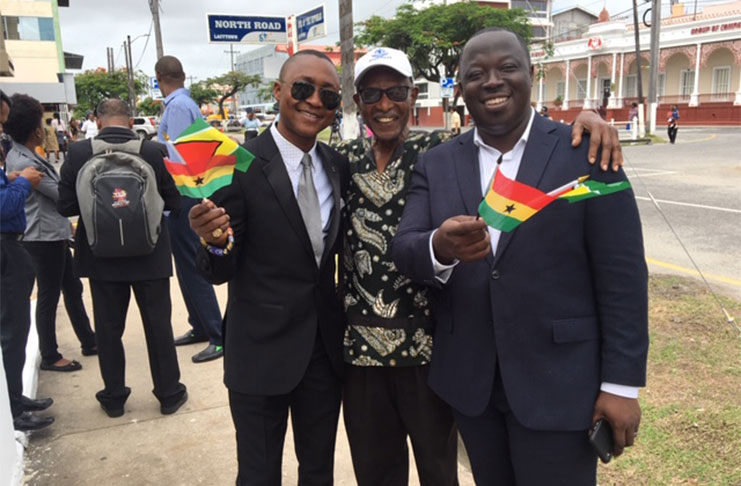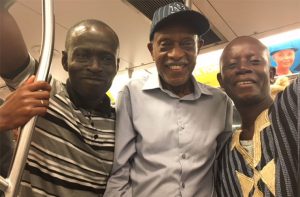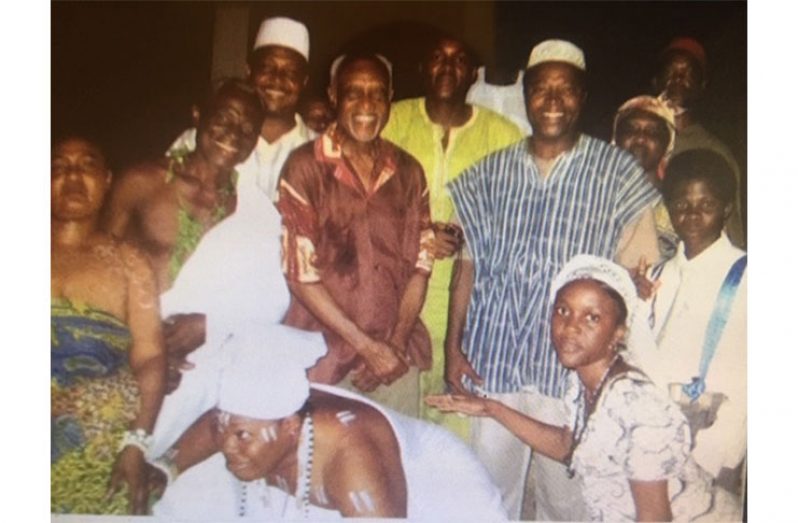By Francis Quamina Farrier
LET me commence by immediately informing you that the headline of this article is actually the title of a book by the Ghanaian Professor Akosua Adoma Perbi. Her book chronicles the system of slavery in Ghana from the 15th to the 19th century and relates the role of Ghanaians in the system of slavery in that West African country.
Guyana recently celebrated Emancipation Day, 2019, and this article is intended to expand the conversation of the role of Africans in Slavery, both as victims and participants. “The History of Indigenous Slavery in Ghana”, according to Akosua Adoma Perbi — Ghanaian woman, mother, wife, author and university professor — was quite different from the way the enslaved were treated in the western world, Guyana included. It is also timely, bearing in mind that the Head-of-State of the Republic of Ghana, His Excellency President Nana Akufo-Addo, paid a state visit to Guyana just a few weeks ago on June 11 and 12, 2019. From “The Door of No Return”, where Ghanaians were shipped off to lands across the Atlantic, including Guyana, Ghana has re-opened that ‘door’ and made 2019 “The Year of Return”, as thousands from the African Diaspora, are welcome (AKWAABA) visitors. For Guyanese, a visa is no longer a requirement; a decision made by the Ghanaian president during his visit to Guyana.

Before going further, it is appropriate to mention that slavery was recorded in Genesis, the first book of the Holy Bible. Chapter 37, Verse 8 states in part: “…and they drew and lifted up Joseph out of the pit, and sold Joseph to the Ishmaelites for 20 pieces of silver.” So there was slavery from almost the very beginning of humans occupying planet earth. What is also appropriate and worthy of mention in this feature, is the fact that throughout history, there has been slavery in all forms; and as Professor Akosua Adoma Perbi further states in her book, “Some slaves (in ancient Ghana) were given the opportunity of becoming heads of the family into which they were integrated .”
There was a sort of upward mobility within the slave system in ancient Ghana. As Professor Akosua Adoma Perbi explains, “The pre-colonial Ghanaian social structure was transported into the social structure political realm.” So it is safe to say that the system of slavery in pre-colonial Ghana, was a much more humane one than existed in the western countries where brutality was the order of the day. One must take particular note that in the system of slavery in ancient Ghana, the African Family structure remained intact. There was no breaking up of families with members being sold on the block to different slave owners as was the case, especially in the United States, where families were broken up and taken to different plantations never to see each other again.
Too often, some Guyanese think and speak as though the Africans were the only people who were enslaved. Reality is far from that perception, since it is a fact that Africans also practised slavery, not only with their own people as victims, but Africans also owned white and other ethnic groups as slaves over the centuries. For many centuries, slavery was a business.
As Guyanese celebrate Emancipation in this year 2019, what is of greater importance, is the phenomenon of modern-day slavery, and the urgent need to ensure that slavery in any form must not be tolerated. Indigenous slavery in Ghana ended a long time ago. In Guyana, there are some Indigenous individuals and others, including refugees from Venezuela — young girls in particular — who are enslaved by employers who subject them as sex workers. Trafficking in Persons (TiPs) is also a form of slavery. That has to stop, according to Sandra Ferrini of Uruguay, South America, whose own mother had sold her into slavery as a sex worker. She has organised a massive protest march in the country’s capital, Montevideo, on the occasion of World Day Against Trafficking in Persons (TiP).
As is known here in Guyana, some individuals who enslave those young Indigenous women have been apprehended by the authorities, charged, tried in a court of law, found guilty and imprisoned. Last Tuesday, July 30, was “World Day Against Trafficking in Persons” (Modern-day slavery), and estimates are that there are about 40 million victims of Trafficking in Persons worldwide. However, civil society, including taxi drivers, are being encouraged to be vigilant in helping to identify victims and report to the law-enforcement agencies.

Returning to the book, “A History of Indigenous Slavery in Ghana,” Professor Akosua Adoma Perbi points out that during the period of indigenous slavery in Ghana, “The slave was regarded as a human being and was entitled to certain rights and privileges.” Slavery in ancient Ghana was not as brutal as it was in North and South America and the Caribbean. In fact, the slaves were generally kept together as a family unit, enslaved to another family unit who owned them. In some instances, a member of a slave-owning family would marry a slave. So the kind of slavery as practised in Ghana was far more humane than was the case in the western hemisphere.
In more recent years, important Ghanaians have been expressing regret and extended apologies for the role some of the ancestors played in the Trans-Atlantic Slave Trade, in which millions of Africans were sold into the most brutal kind of slavery ever known to mankind — especially the breaking up of families. The vulgar curse term “MF” which is still used by some (especially young black males in the United States), was derived from the fact that after the Atlantic Slave Trade was put to an end, and slave owners had their slaves engage in breeding programmes for an increase in their numbers. Some men were even put with their own mothers to procreate, hence the term “MF”, which sadly, is still used in some inner cities of the United States.
During my 2012 visit to Ghana, I stumbled onto a bit of research. It pertained to the feeling with Ghanaians about the role of the Chiefs and Kings of the past and their roles in the Trans-Atlantic Slave Trade. While in a conversation with Fr. Banzo, a Catholic priest at the Kristo Busae Monastery in Techiman, I asked in a rather melodramatic tone of voice, “Why did you sell me into slavery?” His immediate response was, “Oh, that was terrible. That must never happen again.”
It was as though he had personally sold me into slavery. I continued that questioning with a few other Ghanaians and always got a similar response. During the past few years, Ghanaian Chiefs have been officially expressing remorse and apologies on behalf of those Ghanaian ancestors who sold their brothers and sisters into slavery — much like the brothers of Joseph in the Genesis book of the bible, who sold their brother into slavery.



.jpg)










